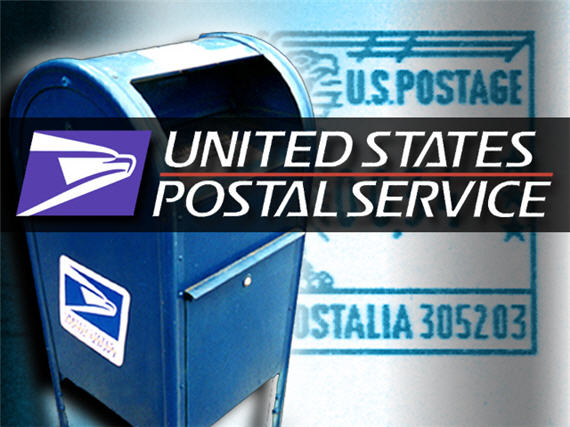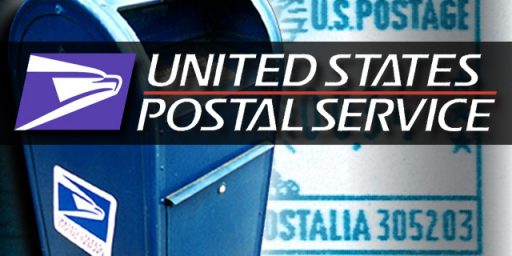Subsidize Broadband, Close the Post Office?
Fast Internet access is becoming a necessity for modern life. Should we subsidize it by eliminating the Postal Service?
Matt Yglesias muses, “instead of having a US Postal Service whose main mission is to provide subsidized delivery of pieces of paper to low-density areas, we could have a government telecommunications entity whose purpose is to provide fast wireless broadband everywhere.”
It should be noted that the USPS isn’t actually subsidized; it’s a commercial entity required by law to be self-financing. It has, however, fallen on hard times with the recession and the GAO is worried that it may need a taxpayer bailout. Postmaster General John Potter explains that, “A small annual appropriation from Congress reimburses the USPS for free mail for the blind and absentee-ballot mailing for overseas military personnel. Otherwise, we have not received taxpayer funds to support postal operations since 1982.”
So, there isn’t enough cost savings to be had here to subsidize broadband.
Still, on the surface, Matt’s larger point strikes me as correct. Fast Internet access is becoming a necessity for modern life whereas home mail delivery strikes me offhand as a relic of a bygone age.
Almost all of my mail is either magazines, catalogs, or unsolicited junk that goes into the recycle bin unread. But maybe I’m unusual in this regard? Maybe poor people, the elderly, and others who live in different circumstances really need a mail truck to come by six days a week and deliver important things to their homes?
As for broadband access, we’re already subsidizing it to some degree with FCC taxes on our phone and cable bill. I’m not sure what the obstacle is to getting it to those not already subscribing. Is it simply that they can’t afford the monthly fee? And, if they can’t afford that, does that mean we have to subsidize computer purchases, maintenance, and training? Are they living in areas too remote to commercially justify creating the infrastructure?







So, how does a company send the monthly mortgage bill (or, to get with the times, the foreclosure statement) to somebody who doesn’t have a computer? If the answer is “get them a computer and an e-mail account and teach them to use it”, that’s a non-starter. If the answer is a postal-service alternative, such as Fedex home delivery, then will they deliver to somebody in a small, rural town for 44 cents or something even close to that? If not, who will pay for the difference?
Even closing a post office is a political minefield, as stories like this attest:
http://abcnews.go.com/Business/wireStory?id=9759906
and is filled with legal and political obstacles:
http://www.federaltimes.com/article/20101010/DEPARTMENTS02/10100307/1029/FACILITIES02
so getting rid of the USPS would really start a political firestorm.
I would prefer to see mail service radically downsized over eliminating the service altogether. For those over say 50 the computer challenged population is too large to depend only on the internet. In the near term until the tech-savvy generation takes over there is much that could be done to save postal costs.
A few suggestions:
– Six day delivery with routes receiving mail either M/W/F or T/Th/F. Any day, Express Mail will serve for the absolutely-gotta-have-it pieces.
-Four sided Kiosk boxes on alternating residential intersections. Individual home delivery is an unaffordable luxury. Stopping at the end of the block or having a neighbor pick up the mail for the home-bound is a minor inconvenience customers would soon accept.
-Outside management staffing oversight. As a 30+ year employee I can attest that there are 2-4 times as many lower and middle level supervisory positions than are needed. I strongly suspect the less visible, higher levels are at least as overstaffed.
-Give all carriers the daily hot sheet for stolen vehicles. The police don’t come close to the area coverage letter carriers do. The savings in theft recovery would be significant with almost no new expenditures. A “Spot and Report” network could also be invaluable during a terrorist alert situation.
Just a few thoughts. I’ll be happily retired soon. It’s been a good job, but the system is long overdue for total revision. Good luck dealing with the postal unions and their political shills.
Would this mean no mail for people in rural areas, or just expensive mail? And if expensive, how expensive? I can imagine that a lot of less tech-savvy people still need regular mail, but they could probably live with reduced or somewhat more expensive service. Have their ever been any studies about what kinds of prices these areas would need to be charged in order for a company to make a profit?
Of course I meant Tu/Th/Sat for alternate delivery days.
@Anon: “Would this mean no mail for people in rural areas, or just expensive mail?”
My guess is that these people would have to drive in to town once or twice a week to get mail at their PO box. Which, frankly, makes perfect sense.
Greetings:
It has long seemed to me that the US Postal Service approaches its difficulties from the point of view of preserving the empire as opposed to what service they are providing for their customers. The mail I receive is almost all non-urgent, bills, magazines, “junk” advertising, A Monday, Wednesday, Friday delivery would be perfectly adequate. If other customers require a greater frequency of delivery, they could pay for it, akin to “Special Delivery” or some new-fangled commercial enterprise fee.
I believe that the Postal Service makes a mistake by trying to whittle back at the margins as opposed to making deep and significant cuts and then trying to rebuild their organization based on their customers actual and future service needs. I think that the success that FedEx has had shows that people will pay more for higher levels of needed service. Unfortunately, the Postal Service seems fixated on the price of a first-class stamp.
Greetings:
As to Mr. Yglesias’ suggestion in regard to broadband, I would be more concerned about letting the government’s camel nose into the internet tent. It seems to me that the current administration has a bit of a proclivity in regard to throwing its weight around in business sectors about which it knows very little. Whatever the intolerable shortcomings are of the current internet system, involving the government is at least just as likely to create more as to remedy any.
As a case in point, there is now a subsidy system for land-line telephone service. Its underlying justification is that poor people might need a telephone for emergency reasons. Now, in my area there are two basic telephone service levels, limited and unlimited, the former being less expensive than the latter. Now, my logic tells me that if “emergency” is the important criterion, limited service would be quite adequate. But no, the subsidy has expanded to the unlimited service because, you know, one never knows how many emergencies one might have, does one. Now the program is expanding into the provision of equipment along with the service subsidy.
This routine of declaring things first a “necessity” and subsequently a “right” is not only sophomoric in that what cannot be so labeled, but is subversive in that it deludes part of our population into endless whining for the next slice of someone else’s salami, which, of course, will require some degree of the compulsive power of our government which knows and does so much better.
Now, on the other hand, if someone were to propose a Constitutional amendment to provide free, equal, socially just broadband to all residents, legal or illegal, that would be something I would consider.
That’s part of it. There are a number of areas where broadband is spotty, if not non-existent, and your only choice for high-speed internet is through Comcast/Xfinity. Which isn’t bad, but it’s nice to have more options.
I’d be in favor of privatizing the US Postal Service and eliminating the “universal service”/monopoly on P.O. Boxes thing. 95% of the mail headed my way is Credit Card Offer Spam Mail, and it’s not like there aren’t a wide range of postal options (like FedEx and UPS).
They just mail it through a privatized Post Office or one of its competitors. It’s not like postal expenses are suddenly going to skyrocket in the areas where most people live (urban areas and their surroundind suburban neighborhoods), and even in rural areas, it’s only a once-a-month mailing.
There’s also phone contact, and so forth.
Not to mention that we might see the other postal companies opening up PO Box style offerings if the Postal Service loses their monopoly on stuff like that.
Rural / urban divide isn’t that great:
“According to a 2007 analysis by U.S. Department of Agriculture Economic Research Service, 63 percent of all rural households had at least one member access the Internet, compared with 73 percent of urban households.”
http://www.internetworldstats.com/am/us.htm
I am guessing that for the foreseeable future 25% of the population will be in one of these three categories:
1. not have regular access to the internet;
2. not have the basic competence to rely on the internet; or
3. not have the resources and/or competence to fix their computer when a problem occurs
Brett: for some legal matters in order for federal express to be treated as good as U.S. mail, there would have to be regulatory oversight.
I had my mail held for a month, and when I picked it up I was amazed at how little there was there, without the bulk mailings (which my PO doesn’t add to the ‘hold’).
My supermarket would need a new way to tell me what’s on sale, but other than that …
CAN BE DONE! All we have to do is migrate to a system of electronic mail and allow it to function like our present mail system of pertinent mail and junk mail and keep a smaller system of snail mail that allows the delivery of bulkier items like catalogs and envelopes with multiple pages and the ship if it fits items. Time is money and were we to reduce the time it takes the post office to sort items like letters and focus on larger items with a higher cost per item then I foresee it being a moneymaker.
One other question is what James means by “Close the Post Office”? Does it just mean having the government cut off what little financial subsidy it provides to the USPS along with removing the regulations it imposes? Depending on how the Post Office restructures itself, it may still be a viable as a business. Does it mean having the government forcibly shut the USPS down? I’m not sure what purpose that would serve. I suppose one could make arguments about “fairness” and protecting Fedex and UPS, but why not just let them compete — that sounds like it would be best for consumers.
P. Carlson sez:
Four sided Kiosk boxes on alternating residential intersections. Individual home delivery is an unaffordable luxury. Stopping at the end of the block or having a neighbor pick up the mail for the home-bound is a minor inconvenience customers would soon accept.
Bernieyeball asks:
I have seen many apartment complexes and single family residence subdivisions with a similar arrangement.
Many Rural Routes have multiple mailboxes clustered together.
Are you proposing more of this type of mail delivery or something different?
Yes, the cluster boxes are becoming common with new construction. If the older residential areas were retrofitted with them, one carrier could cover far more territory. I see no reason even office towers couldn’t have lobby boxes like apartment buildings do instead of the carrier going from office to office, floor to floor.
Don’t like the USPS?
Send a letter from France, Spain or Germany. Relatively tiny countries in comparison with much much higher postage costs, and in the case of Germany, privatized postal systems.
Fed Ex? Good luck with that if you have a PO box.
We are talking about less than $100 million dollars per year in federal subsidies or, to put it in other terms, about a tenth of what US contractors are taking out of Iraq on a monthly basis. And for that we get free postage for the legally blind not to mention absentee ballots for US citizens living overseas.
The above said, do away with Saturday delivery. Not necessary and incredibly expensive.
One more thing, say Hi to your local postal carrier. The odds are he or she is a military veteran.
This will be great news for the elderly who send parcels to little Johnny and renew their passports at the post office. Republicans should campaign on it as a budget saving.
Close the post office? No. Just open the market to competition.
Subsidize broadband? Oh, hell no.
“Subsidize broadband? Oh, hell no.”
I’m afraid that horse has already left the barn. And it costs more in dollars than the post office subsidy,
It would save a lot of trees! And the protected kinds that inhabit them:)
@davebo What subsidy does broadband get, here in the US?
There is no need for ANY government interference in internet provision or broadband. None. Zilch.
@teapartier – I agree.. As soon as governments get involved things get messy – leave the internet to the market to decide the future.